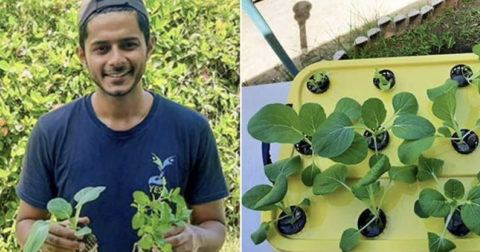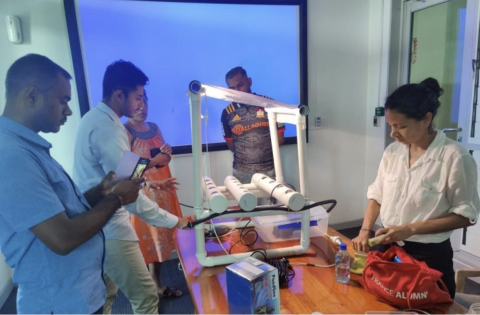Small-scale farmers in Fiji supplement produce using home hydroponic kits
Small-scale farmers in Fiji supplement produce using home hydroponic kits
Smart Farms Fiji provides hydroponic kits to small-scale farmers, with a focus on empowering youth and women. The locally made kits promote food security and climate resilience amidst challenges like adverse weather and market competition, blending modern technology with traditional farming. This story is part of a series celebrating the locally-led solutions supported by the UNDP implemented - Adaptation Fund Climate Innovation Accelerator programme.
Rinesh Sharma’s team has just delivered several hydroponic kits to mostly young women in Fiji.
He says a single ‘Smart Gro Box’ kit can sustain one to two people using locally-available materials like coconut husk and river rocks.
“We have a lot of coconut trees in Fiji, so that’s used as a growing medium,” says Sharma. He says repurposing husks also encourages people not to burn off coconut waste, which contributes to pollution.
Back in 2018, Sharma founded his non-profit organisation, Smart Farms Fiji. His idea was to support subsistence farmers in producing fruit and vegetables year-round using precision agriculture, in the form of a controlled hydroponic system.

He set out to bring the technology to 150 community members in Koroipita using a grant from the Adaptation Fund and European Union, which supports climate innovation in developing countries through the UNDP-Adaptation Fund Climate Innovation Accelerator (AFCIA) programme.
Koroipita is a settlement in Fiji’s second largest city, Lautoka. A project report indicates that the 150 recipients of the smart farming kits consisted of 80% youth and 75% women, as well as 1% persons living with disabilities.
Sharma says the project encourages healthy eating and food security at the household level and raises awareness about agricultural resilience in the face of climate change.
They provide the kits to people who already farm on soil. The idea is to add on to what those individuals are already producing and consuming, and to build on their existing agricultural knowledge.
Each recipient thus receives training to understand the science behind the hydroponic growing process. Sharma says they explain in a very simple way how to avoid crop failure since hydroponic systems globally have a rather high failure rate.

“We provide them with a briefing on how to get on with this and how to have a successful system,” he says.
But despite the steep learning curve, there are many benefits to hydroponic systems.
“Hydroponic cultivation techniques require less water than traditional agriculture practices, allow for greater plant diversification, and are portable, thus allowing for plants to be relocated during extreme weather events,” he explains in a project report.
He says Fiji has been experiencing unprecedented adverse weather conditions. “We had some massive rain pouring down and a few people I know got their kits into the safety sheds or storage.”
The home kits are small and easy to transport, he says, but even those farming with hydroponics on a larger scale are able to safely stow away their components. “Once the weather is fine, they fix it all back together.”
Another plus of the Smart Gro Box is that it is built from scratch in the Fiji Islands. Sharma says they use local raw materials and labour where possible so as to respect and preserve Fijian culture and authenticity.
Sharma says, however, that because Fiji relies heavily on imports and has experienced fuel price hikes, prices have soared since the start of the project. “It was a challenge to negotiate the prices we initially had asked for with the suppliers,” he says.
He adds that the market in Fiji is not what it may look like from the outside. “Everyone loves your initiative and will give you a thumbs up, but trying to stay relevant and trying to enter any market … you’ll have throat slitting competition and the business Mafias will try to cut you off or shut you down. That’s the reality.”
For this reason, Sharma says that if more funding became available, he would be able to pinpoint particular deserving farmers that would stand a good chance of success, and would advocate for “backup support” from the country’s ministries.
The current project already aligns itself with Fiji’s National Adaptation Plan to “promote and integrate climate-smart agriculture practice”.
He says they are working to connect some of the young and ambitious entrepreneurs who are beneficiaries of the project to other initiatives, and that his foundation will soon support one hundred women vendors who are already selling their produce at the market.
“A lot of them are in horticulture; a lot of them are in the sales of flowers and bouquets,” he says. If his team is successful in obtaining further funding, they will support these women to navigate the high stall fees.
Sharma says that overall, this support and the hydroponic kits represent a coming together of modern technology and traditional practices to sustain farming and livelihoods on the island.
About this article:
This story has been co-created with the support of Smart Farms Fiji, UNDP, CDKN, ICCCAD, and GRP, under the framework of the UNDP-managed Adaptation Fund Climate Innovation Accelerator (AFCIA).
The UNDP-AFCIA programme counts on financial contributions from the Adaptation Fund and the European Union and has awarded 44 micro and small grants to locally-led organisations across 33 countries worldwide, accelerating their innovative solutions to build resilience in the most vulnerable communities.
UNDP-AFCIA, is one of the funding windows anchored under the Adaptation Innovation Marketplace (AIM), a multi-stakeholder strategic platform that promotes scaled-up adaptation at the local level, launched by UNDP Administrator Achim Steiner at the Climate Adaptation Summit in January 2021.
